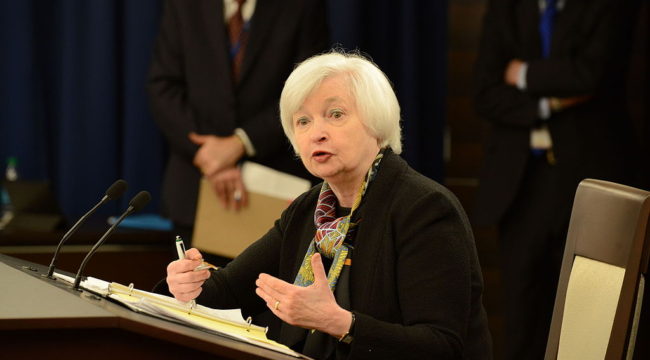The Fed Under A Trump Presidency
Now that the election is over the media has started to swirl about president-elect Trump’s appointments. They are well deserved conversations in to be had over hypothetical appointees. However, one major appointee (outside of Justices on the Supreme Court) might continue on, even after the Obama administration is out of the Oval Office. But she very well could be ousted.
Enter the Federal Reserve and its leader, Janet Yellen.
In the midst of a debate stage whirl Trump fired out at the US central bank claiming that, “When they raise interest rates, you’re going to see some very bad things happen, because they’re not doing their job.” He pointed out his thoughts of a Federal Reserve “doing political things” and took direct aim at what might happen after a potential rate hike.
While Yellen might not be a “bad hombre” from Trump’s point of view, she is certainly standing in the way.
This has not always been the case though.
While speaking with CNBC in March, Trump hinted at his sentiment toward Yellen by saying, “People that I know have high regard for her, but she is not a Republican.” He went on to say that, “When her time is up, I would most likely replace her because of the fact that I think it would be appropriate.”
Can Yellen Be Fired?
When Yellen, a democrat, was appointed to the Fed by President Obama she was serving in the second highest post at the U.S central bank.
Prior to landing a spot at the Fed she had worked as the head of the council of economic advisers in Bill Clinton’s administration. Once she was confirmed, she would fill Republican Ben Bernanke’s seat.
As it stands, the leader of the Fed’s term is set to end at the beginning of February 2018. However, she could remain on the Fed’s seven person board even if Trump were to decide to not nominate her for another term. In the overall picture, Yellen has a 14 year term as a member of the Federal Reserve’s board which is not scheduled to expire until January of 2024.
“He’s not urging her to resign at all,” Judy Shelton, a Trump advisor and an economist and senior fellow at the Atlas Network, told the WSJ.
This after Donald Trump said during the first debate that Yellen “should be ashamed of herself” when speaking on the actions of the Fed.
While debate and rhetoric are one thing, policy differences and actions are another. There is a key line between adverbs and programs.
Jim Rickards, while on Bloomberg two days after the groundbreaking election, spoke on the incoming Trump administration’s potential financial policy. He noted that, “He is the helicopter president. Trumps policies really are Larry Summers policies. More deficits. Fiscal spending. The question is how will the Fed respond?”
So what does Yellen have to say about Trump? Not much.
In September, Yellen was asked about the accusations from Trump and responded saying that The Federal Reserve is not politically compromised. We do not discuss politics in our meetings. She went on to state, “It is important that we maintain the confidence of the public. I know that these are difficult decisions.”
The Prospect of Yellen Leaving
Could Yellen quit? In a short answer, yes. Is she likely to quit, no.
Federal Reserve chairs have often served under multiple administrations from opposing party lines. Even Bernanke, Obama’s first head of the Fed hailed from the republican wing.
History sends clear signals. The Treasury-Federal Reserve Accord passed in 1951 was set to be the “liberation of monetary policy” in the wake of World War II and the lack of independence of the US central bank during global fighting.
Since then, the Accord was set to be a foundation for the modern Federal Reserve. What it means for today is that every single Fed chair since 1951 has served under various administrations (with the exception of Yellen – so far).
In fact, the closest we have come in modern times to a Fed chair resigning under political differences with an administration was Paul Volcker (originally appointed by Carter) in 1986. At that time President Reagan engineered a cut in the Fed’s discount rate against Volcker’s set policy design. Volcker was believed to have come close to stepping down then but stayed on to nearly finish out his term.
History of both the Fed and its leaders gives a signal of what to expect going forward. Whether Yellen will carry on those norms will likely unfold in the coming weeks and months.
While politics might not be a part of the Fed meetings, the Chair is not mute to a national partisan divide. If she was to exit her position early, it would be in direct contrast to her party leanings. It would also give even greater influence to Trump’s administration in the area of influencing regulation and monetary policy.
Wall Street’s Take
Alan Levenson, T. Rowe Price’s chief economist following the election said, “Ultimately, Trump’s policies threaten to undermine global faith in the independence of the Federal Reserve and the geopolitical standing of the United States.”
Although as a pushback to Federal Reserve current policy, former US Treasury Secretary Larry Summers took to Bloomberg to say, “The risks in policy are more to the downside than they are to the upside. In a time when inflation expectations are still reflected in markets well below 2% on the Federal Reserve’s preferred price index I have not seen the case for rate increases.”
Even from the top bankers such as Michael Feroli, at JPMorgan said on Trump and the Fed, “we don’t see a rationale for the apparently Democratic Yellen to give President Trump even more influence over the course of monetary and regulatory policy by immediately stepping down,” Feroli wrote. “That said, we doubt she would stay on as Governor even after her term as Chair expires.”
What Trump’s Relationship With The Fed Means For You
The Fed is ultimately an institution with a Congressional mandate of fostering maximum employment throughout the economy while also keeping prices stable. During a period of major transitions of executive office power, these two core mandates are pivotal. Your money, the ability to save and the economic stability of markets very well could be in the crosshairs. What the Fed indicates matters to markets. What the President says matters to the economy.
The market will be keeping an even greater-than-usual eye on what happens to both Yellen, the Fed and monetary policy from within the central bank.
Though the case for Yellen to stay on as Chair of the Fed after her term has come to expire is highly unlikely, it just as doubtful that she would take an early exit (Fedxit, anyone?).
Trump has said on various occasions his intent to “audit the Fed” within his first 100 days in office. While that might simply be a “pie in the sky” outlet – it certainly would leave those in the Eccles building wondering what is to come. Could a surprise Yellen exit be in store?
Stay tuned.
Regards,
Craig Wilson, @craig_wilson7
for the Daily Reckoning
Ed. Note: Sign up for a FREE subscription to The Daily Reckoning, and you’ll receive regular insights for specific profit opportunities. By taking advantage now, you’re ensuring that you’ll be set up for updates and issues in the future. It’s FREE.



Comments: